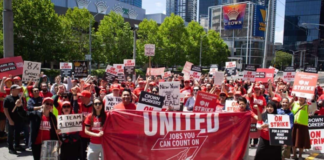Syria’s revolution, which was inspired by the Arab Spring in Tunisia and Egypt, has now become a full blown civil war open to growing imperialist interference. But it retains a democratic core which is determined to maintain its independence.
Since 2011 the Arab revolutions have dissolved the certainties that competing imperial and regional powers have counted on for decades. Interference in Syria is part of the fight over who will come out on top.
Russia and the West have been increasingly trying to profit by influencing different sides of the conflict.
Last month Russia announced it would be sending advanced S-300 missile defence batteries to Assad, in addition to supplying large quantities of arms to the regime and defending Assad against UN sanctions.
It is quite clear Russia’s geo-strategic and economic interests are threatened by the revolution—Assad has been Russia’s only Arab ally and hosts Russia’s only Mediterranean naval base in Tartus.
The Western powers have lost allies in both Ben Ali in Tunisia and Hosni Mubarak in Egypt. Combined with the legacy of defeats in Afghanistan and Iraq, this means that the US and the West are anxious to co-opt Syria’s revolution.
A central goal is to make sure the revolution serves Western interests by maintaining secure borders with Israel.
The US announced a $250 million non-lethal aid package for the rebels in April. At the behest of France and Britain the EU also lifted its arms embargo in May allowing them to arm the rebels.
But the West doesn’t trust the rebels on the ground. There are no immediate Western plans to arm the rebels and only a fraction of the aid announced has reached them.
Instead the West is using the prospect of military aid for the rebels to try to push Assad into peace talks aimed at securing a settlement with the rebels over the coming months.
Nevertheless, we have seen the outcome of foreign intervention by the West in Libya. Its result would be acceptance of Western control of the region as well as neo-liberal policies and the strengthening of sectarian groups on the ground.
Assad’s anti-imperialism
Some who supported the revolutions in Egypt and Tunisia against Western-backed dictators have been unwilling to support the Syrian revolution. They claim it would remove an anti-imperialist regime hostile to the West.
Syria under Bashar al-Assad and his father Hafiz has been an opponent of Israel at times. After the 1973 Arab-Israeli war Syria refused to sign a peace deal with Israel, and Assad has helped funnel arms to Lebanese resistance group Hezbollah.
But Assad’s anti-imperialism has been completely inconsistent. He joined the West in the 1990-91 Gulf War on Iraq. Tellingly, Israel’s military chief Benny Gantz has said he’s now more worried about the rebels than Assad.
In a disastrous development, Lebanese Hezbollah fighters are now fighting in Syria to help prop up Assad. The fact that the mainly Shia group is helping to prop up a Shia dictator will only fuel sectarianism and undermine the pan-Arab solidarity which has been key to the major offensives against Israel such as that in 1973.
The revolution’s character
The military nature of the struggle makes it easier for world and regional powers to buy influence. The rebel groups are desperately short of arms and many have called for Western support. This has produced a growing influence for Islamist fighters able to secure weapons through foreign funding.
But much of the Syrian revolution remains determined to maintain its independence. In areas abandoned by the regime, many towns are run by popular committees that attempt to maintain services and food supplies.
A legitimate popular revolution is still taking place that deserves our support.
The Syrian revolution began as a protest movement in March 2011, demanding increased political freedoms. The movement emerged against the backdrop of neo-liberal policies that had seen the rich get richer and the poor get desperately poor in preceding decades. Assad responded to the protests with mass arrests, torture and live ammunition. By April he was launching military operations. A defensive armed response by revolutionaries was fed by defecting sections of the military. By mid-2012 the regime had lost control of massive sections of the country.
Despite the democracy at the root of the revolution, sectarianism poses an urgent threat. With sectarian attacks against Sunnis being carried out by Assad, Hezbollah joining the fray and the increasing influence of Sunni Islamist groups, a strong political counter-weight will be needed to keep the heart of the revolution beating.
Adam Adelpour





